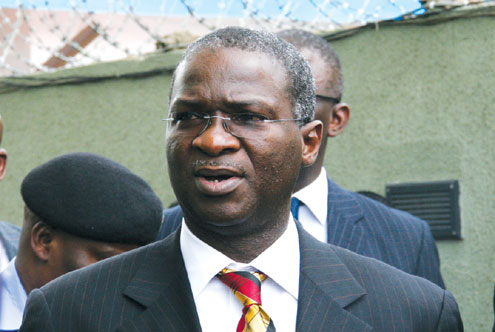Minister of Works and Housing, Mr Babatunde Fashola, says adequate housing is key to sustainable transformation of the society and communities.

Fashola said this while virtually hosting stakeholders in the industry on Monday, October 5, 2020 in Abuja.
He made this ascertion as the commemorate the World Habitat Day, celebrated every first Monday in October every year.
This year’s theme is “Housing for All: A Better Urban Future.”
Fashola said though the pandemic had made an already difficult job more challenging, government is resolved to improve access to affordable housing, sanitation, jobs and social economic opportunies.
“We believe that a better urban future is within our reach. We recognise also that inclusive affordable and adequate housing is the key to sustainable transformation of our societies and communities.
“We are therefore committed to delivering houses that are sustainable, healthy, and housing that is inclusive, adequate, safe and affordable.
“A people-centered approach to housing is vital for the character, shape and social economic vibrancies of our cities as it is to public health concerns.
“For us therefore, housing connotes more than merely providing shelter, it signifies construction and jobs, which boost economic growth and reduce unemployment figures,” Fashola said.
Mr Aliu Abubakar, Minister of State for Works and Housing, said housing is fundamental to health.
According to him, the tenth Urban Forum held in February focused on promoting smart intelligence and technologies, creativity and opportunities in cities must be utilised and sustained.
Mr Ernest Umakhihe, Permanent Secretary in the Ministry of Works and Housing, said the day presents an opportunity for reflection, stock taking and for strengthening the common resolve for accelerated action in the pursuit of sustainable housing.
“This year’s observance is even more pugnant as we face the realities of COVID-19 pandemic which has adversely affected human activities all over the world in diverse ways and has also affected the pre-existing houses and urban development conditions.
“Undoubtedly, without adequate housing and decent living, communities as reflected in the Goal 11 of the Sustainable Development Goals, the remainder of the 16 SDGs, will be difficult to realise.
He said he was optimistic that better life could be built and a better future for all Nigerians via dialogue.
Speakers at the occasion also said efficient financial institutions and partnerships would help to promote the desire of citizens to own their own homes.
In a paper titled: “A New Housing and Urban Development Framework for Nigeria”, Prof Isaac Mebolugbe, Senior Urban Research Advisor, John Hopkins University in the US, said the country needs to build strong financial institutions that could provide the stronghold for citizens’ desire to own their own homes.
He added that there was the need to design modern development structures that would orchestrate development.
On his part, Prof. Gbenga Nubi, Director, Centre for Housing and Sustainable Development, University of Lagos, said it was time to start supporting cooperative housing by government not just on paper but in reality.
Nubi called for housing education for the citizenry, adding that nation building requires creative thinking and leadership that walk the talk.
“A healthy housing sector shows a thriving economy. In the U.S., 72 percent of the citizens own their houses, in U.K. 78 percent, Singapore 92 percent but in Nigeria 10 percent.
“Housing indicates the welfare of the people so more needs to be done to improve home ownership in the country.
The Managing Director, Family Homes Fund, Mr Femi Adewale, said new approaches are required to provide housing for the population.
Adewale called for better partnership between government and agencies as well as the private sector.
The World Habitat Day was established in 1985 at the UN General Assembly to focus on the state of human settlements and the basic right of all for adequate shelter.
By Perpetua Onuegbu
